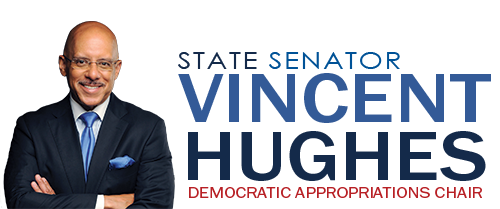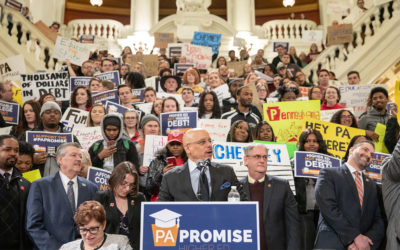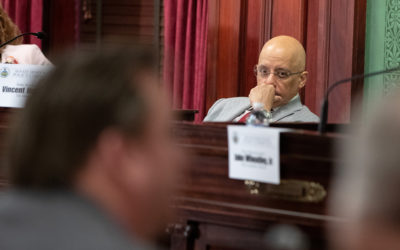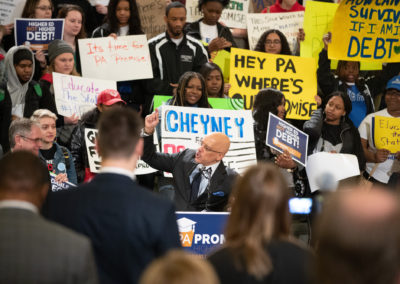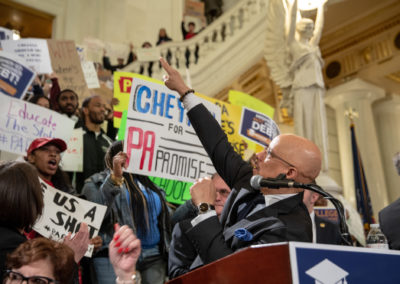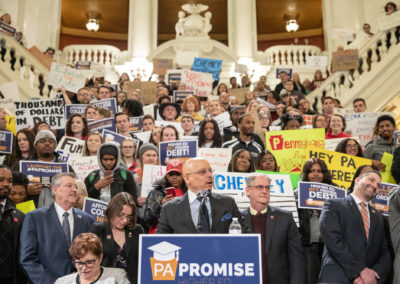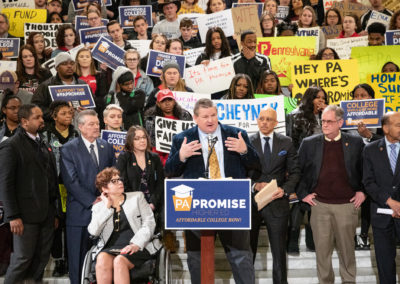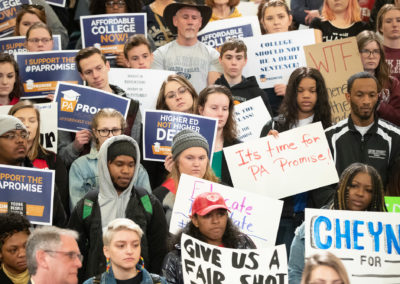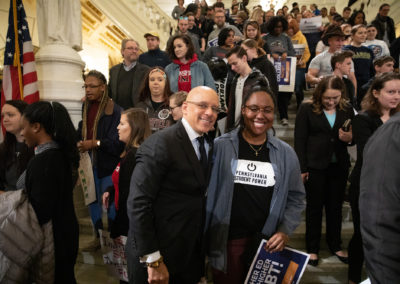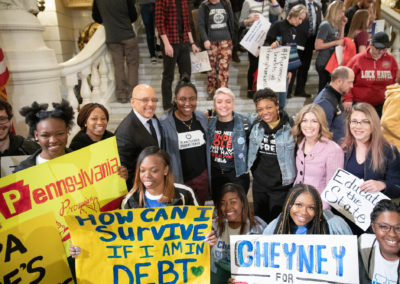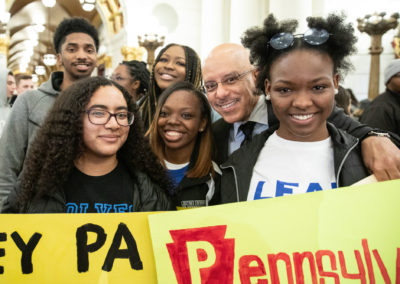
Pennsylvania Promise
Free and Affordable Education for All
One of the most troubling challenges facing many students and families across Pennsylvania is the high cost of education. This is often such a high hurdle that many students simply forgo a college education and are prevented from acquiring the skills necessary to gain better positions with higher wages.
The education gap caused by a lack of access to college or advanced education is, for many low-and-middle income students, the one faction preventing them from gaining traction in the workplace. In our increasingly complex and high-tech economy, it is essential that we make, then fulfill, the promise to Pennsylvania students: YOU will have access to a high-quality education without the burdens of crippling debt.
That’s what the Pennsylvania Promise is all about. The Pennsylvania Promise is available to students with family incomes of $110,000 or less. It provides for grants of at least $1,000 per year for community college students for two years and a minimum of $2,500 per year for four years to Pennsylvania State System of Higher Education Schools and state related institutions.
The program also provides $50 million for adults in families whose incomes are less than $110,000 to acquire up to four years of postsecondary credit.
Help us make the Pennsylvania Promise a promise fulfilled.
-
- Contact your legislators and tell them to support Pennsylvania Promise. (Click here to look up your elected officials.) Not sure what to say? Click here for sample messages.
- Sign our petition calling for Gov. Tom Wolf to support Pennsylvania Promise legislation.
- Spread the positive message about Pennsylvania Promise on Facebook, Twitter, and Instagram using #PApromise. You can even add a #PApromise overlay to your Facebook profile photo.
- Attend a Pennsylvania Promise rally.
- Organize your own rally or house party. Email info@PApromise.org to get started.
- Share your higher-education story. Click here to submit information.
- Give. Whether you can contribute $1 or $1,000, you can help make higher education affordable in Pennsylvania.
Video
What Does Pennsylvania Promise Mean To Us
WITH,  OUR COMMONWEALTH COULD:
OUR COMMONWEALTH COULD:

Cover two years of tuition and fees for any recent high school graduate enrolled full-time at one of the Commonwealth’s 14 public community colleges

Provide four years of tuition and fees not to exceed the State System tuition rate, depending on family income, for students accepted into a state-related university

Cover four years of tuition and fees for any recent high school graduate with a family income less than or equal to $110,000 per year accepted into one of the 14 universites in Pennsylvania’s State System of Higher Education

Finance the expansion of grant assistance to adults seeking in-demand skills and industry-recognized credentials, as well as college credit
Pennsylvania Promise
Latest News
Making College Affordable in Pennsylvania
WATCH: Senator Hughes shares an update on the fight for free and affordable higher educationLawmakers are currently working on negotiating Pennsylvania’s next budget which could impact many aspects of life in Pennsylvania, including public education, public safety,...
Senator Hughes Applauds Progress on PA Promise Legislation in the House of Representatives
Harrisburg, PA – December 12, 2023 – Today, Senator Vincent Hughes, Senate Democratic Appropriations Chair, applauded the movement of House Bill 1886 in the House of Representatives. The bill would create the PA Promise Pilot Program to provide “last-dollar” college...
Students Support PA Promise
Students Support PA Promise
Students Support PA Promise
Senator Hughes, Why Not Free College
Senator Hughes stands with Reps. Harris, Roebuck; hundreds of PASSHE students in call for free college through the Pennsylvania Promise initiative
HARRISBURG, PA, March 27, 2019 – Hundreds of Pennsylvania State System of Higher Education Students rallied with Senator Vincent Hughes (D-Philadelphia/Montgomery), Representative Jordan Harris (D-Philadelphia), Representative James Roebuck (D-Philadelphia),...
Senator Hughes Continues Push for Free College Through PA Promise
Senator Hughes Remarks from the Policy Committee Hearing on Higher Education Affordability
Joint State Legislative Hearing Focuses on College Affordability
Harrisburg, March 26, 2019 – Democratic lawmakers today held a joint Senate-House hearing in Harrisburg on legislation aimed at making college more affordable. The joint state Senate-House Democratic Policy Committee hearing focused on the proposed “Pennsylvania...
Senator Hughes Senate Floor Remarks on Higher Education Affordability
Senator Hughes Resolution on Higher Education Affordability Week
Keeping the Promise
Legislation
Senate Bill 1151
This bill creates the Grow Pennsylvania Merit Scholarship Program to be administered by the Pennsylvania State System of Higher Education (PASSHE) in cooperation with Pennsylvania Higher Education Assistance Agency (PHEAA). This bill defines “Merit Scholarship” as meaning a waiver of an amount equal to the differential between tuition for a resident and nonresident student (effectively providing out-of-state residents in-state tuition). To be eligible, an out-of-state student must be enrolled in an approved course of study, maintain a GPA of at least 2.5 on a 4.0 scale, be enrolled in an approved course of study, and enter into a written agreement to satisfy all their degree requirements and seek employment in the Commonwealth after graduation.
An approved course of study includes programs that provide instruction in the following:
- Agriculture
- Computer Science
- Business
- Education
- Engineering
- Nursing
- Criminal Justice
- Other in-demand occupations
Senate Bill 1150
This legislation, Grow PA, will be in a multi-bill package and will address the following areas:
- Creating the Build PA Scholarship Grant Program, which will encourage Pennsylvania students to enter industries that grow the economy;
- Creating a Merit Scholarship Program, that will incentivize young people to move to PA and enter certain fields of study, while remaining here after graduation;
- Expanding the Ready to Succeed Scholarship Program;
- Expanding participation in the Targeted Industry Support Program to provide more certificate-based learning opportunities;
- Increasing dual enrollment opportunities;
- Providing historic investments in career and technical education while addressing obsolete program requirements that serve as unnecessary educational program barriers to critically needed career fields;
- Expanding the state’s existing Foster/Adopted Child Program nationwide;
- Encouraging universal FAFSA completion so students and families know what financial aid packages are available to them; and
- Creating a performance-based funding model for state-related universities.
Senate Bill 111 and House Bill 244 (2019-2020 Legislative Session)
The bills aim to make higher education free or affordable at public community colleges, Pennsylvania’s State System of Higher Education (PASSHE) and state-related universities that receive state funding. Pennsylvania Promise would be available to recent high school graduates as well adults seeking in-demand skills and industry-recognized credentials, as well as college credit. The goal of the program is to reduce student debt and assist low and middle-income families with paying for higher education.
Why we need The Pennsylvania Promise
Pennsylvania ranks 40th in the nation for the share of adults with an education beyond high school
According to the Institute for College Access and Success, 70 percent of Pennsylvania students graduate with college debt
The per capita funding for higher education in Pennsylvania ranks 47th in the nation
Every student who is accepted to a school and has been reviewed for appropriate federal, state and institutional grants has an option to fund the “last dollars” and get that student into school
Low income graduates borrow at far higher rates (and higher amounts) than middle or upper income graduates
Research estimates that by 2020, 63 percent of new jobs in Pennsylvania will require some level of higher education. Currently only 40 percent of Pennsylvania residents have a higher education degree.
A 2013 Brookings Institute study showed that many high-achieving students from low-income families do not apply to some college or universities because of cost;
This proposal is in line with what New York, Tennessee and Oregon have done and can reduce debt for Pennsylvania students.
A 2015 study found that increased college costs reduce minority enrollment. A $1,000 tuition and fee increase would reduce minority enrollment by more than 2.5 percent
In 2008, students and families paid approximately 36 percent of the cost of public college, by 2014 they paid approximately 50 percent.
